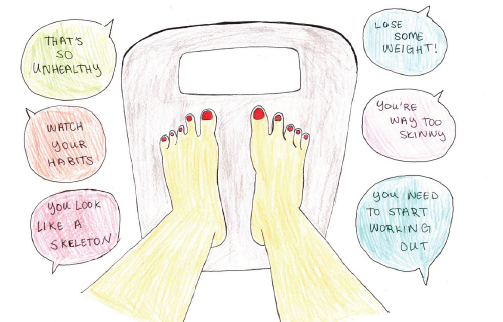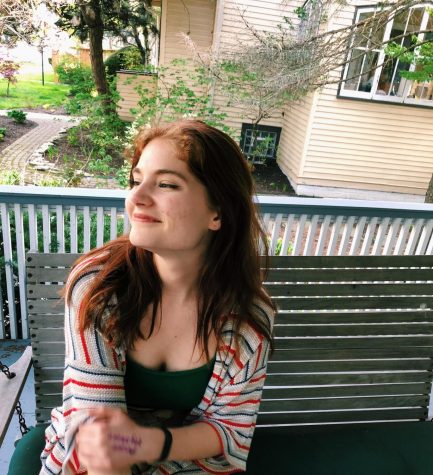My weight loss experience: skinny doesn’t always mean healthy
September 27, 2019
A customer stands on the other side of the counter at my work, eyeing the menu. She’s older, and she stands like she’s holding herself in.
“The food here is so caloric,” she laments, then takes a step back and looks at me. “You don’t eat here, do you? You certainly don’t look it.” My face flushed red; she ordered a salad, “hold everything but the vegetables”.
I’m not quite used to how others see me. Since June 2018, I’ve lost almost 50 pounds, prompted by the desire to obtain a “revenge body”. At some point between then and now, I began noticing how the world sees people in smaller bodies. As I slimmed down, I started to receive unprompted comments from well-meaning strangers and loved ones alike, telling me that I looked “so much better”. I found that men were more likely to yell from their cars or greet me on the sidewalk, and even dressing room attendants were kinder.
All of this plays frighteningly well into our culture’s body ideals. When I made the choice to change my body physically, everything and everyone around me told me that I would be happier: skinny meant pretty, and pretty meant fulfilled. After scrolling through dozens of before-and-after Instagram transformations, I was eager to make myself smaller, to better fit into the world. But none of that happened. After losing the weight, I didn’t suddenly fall madly in love with myself, and nobody fell in love with me. I didn’t feel more whole, or more blessed, or even prettier. More than anything, I felt lied to.
My weight loss experience told me the truth about our bodies: that health cannot be determined by size. It’s an often debated subject, met with scientific evidence and personal factoids from all sides of people fighting to define the bodies of others. I found that people were so quick to judge by their first glance: when I first began losing weight and my family marveled in how “healthy” I looked, I was eating pints of Halo Top for dinner twice a week (and my intestines were feeling the effects — erythritol is no joke). Because I was obsessed with looking how I thought healthy should look, I completely neglected how I felt.
But human health is implausibly complex, and there’s so much more to our wellbeing than caloric balance. For several months, I felt constantly fatigued and irritable, convinced that my body was a machine and I had to hard-wire it to look as physically perfect as possible. I ate enough, and my diet was comprised mostly of whole, natural foods, but at the end of the day, I realized that denying my body’s natural cravings only left me feeling dejected. Sometimes, it’s best to just eat the Cinnamon Toast Crunch and move on.
Whether or not we’re conscious of it, our world is obsessed with losing weight. I grew up in a family full of women, all swinging back and forth between different diets in the hopes of waking up and looking like a Hadid. Nearly every time I listen to the radio, I hear an ad blasting empty promises of your best body, achieved only by this gym membership/this prepackaged Keto shake/this waist trainer. There are even whole communities devoted to avoiding food, including the Subreddits r/fasting and r/1200isplenty, platforms that celebrate those who avoid eating as little as possible in order to evoke rapid fat loss. These all live by the same rhetoric: that food is dangerous, and the less we eat, the better off we are. This messaging harms our personal relationships with food, and in extreme cases, can lead to disordered eating behavior, which will affect over 30 million people in their lifetimes, according to The Body Image Center.
These ideas could not be further from the truth. We eat food for a reason: it gives us energy, it keeps our body functioning, it makes us human. I urge everybody to adopt a diet based on sustainability, to eat for energy, based on what makes us happy. We all deserve healthy relationships with food, and mindful eating is the best place to start.





















